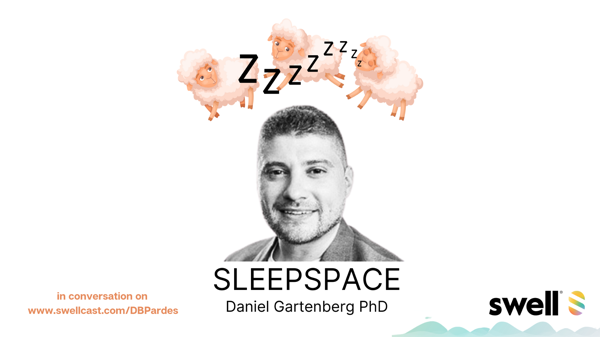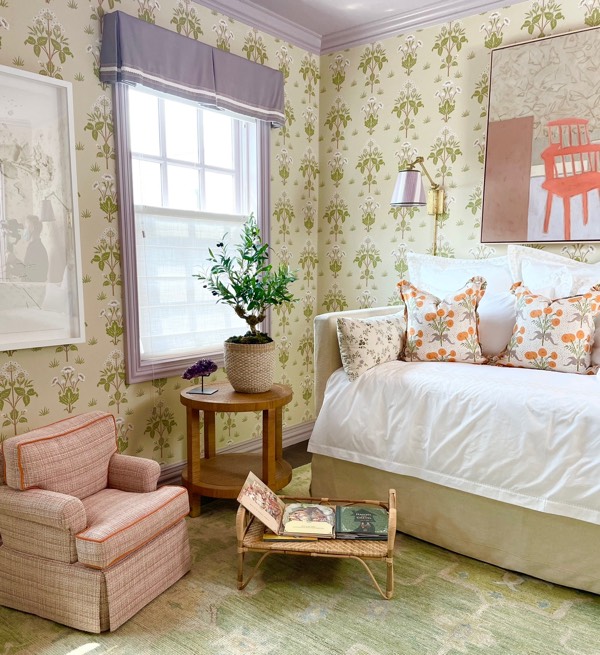
Deborah Pardes
@DBPardes · 2:35
If SLEEP is so natural, why are we so bad at it? Here’s some science behind our tossing and turning.
Okay. Truth be told, I have never been more excited about a conversation than the one I'm about to have with Dr. Daniel Gartenberg, because I have sleep problems. So this is so personal. But it's not just about me. It's about millions of people who toss and turn and don't sleep well. And we're going to talk to one of the premier scientists in this field. He is also the CEO of Sleep Space

Gail Nobles
@GailN · 0:58
Hello. I don't sleep well sometimes because I wake up going to the bathroom a lot and that can interfere with sleeping. Sometimes I get caught up in doing something I love at night and I don't go to bed when I should and sometimes I can't sleep anyway way so I do something until I fall asleep. Having things on my mind can help me not to sleep. If I do go to sleep with things on my mind I have crazy dreams sometimes that makes me get up early
Really changing our thoughts, feelings and behaviors around sleep is the main way to address something like insomnia. And when it comes to what that actually means there's really a prominent theory called the three P model which basically says that you have predisposing traits that make you more or less susceptible to something like insomnia. And some people are even born with tenser muscles or more worrisome thinking style. And so it's somewhat hereditary
If you are particularly wound up because you're engaged in some activity or you have to do work, then be aware of that. And don't try to sleep. Actually. Instead go to bed only when you're tired. And this will help create this association with your bed and sleeping. And on those days where you know you're particularly wound up, maybe you could take a warm back bath or do some kind of relaxation exercise to address rest of the problem. Hope it's helpful

Gail Nobles
@GailN · 0:10
Hello. Thank you for your reply. Thank you for all your information. I appreciate it. Thank you

Deborah Pardes
@DBPardes · 1:01
What's exciting to you right now about your research? What are you finding? What are you working on? One particular thing that we would understand that's kind of around the corner or something you're actually looking at right now that's a bit tech based, that you think might be a real help to people
And I think that with all the technology and the social media and so much stimuli throughout the day, it's becoming more and more important for us to take control of our brains. And sleep is the way that we do this because sleep is essentially how we process information and integrate it into our long term personalities. So my research has been focused on how to do this using the science of sound

Deborah Pardes
@DBPardes · 1:16
Because I'm so interested. There's so many people that get these sound apps and they don't know which one to choose, which one's better for them. They talk about megahertz and REM being affected by certain frequencies. Can you just dive in that a little more? I really appreciate your time and we could take a break after this and see if some more people have ideas and thoughts

Prabha Iyer
@PSPV · 4:17
The commitment, the responsibility that we have does not allow us to sleep properly. Sometimes the dreams that we see in the sleep also embarrasses us. It's a pregarious situation wherein we have to get up and we have to go to the restroom or we have to keep drinking some water. We feel so embarrassed. If it is a good dream, we feel happy about it. And sometimes dreams are also not good in sleep
So that's sort of the overarching science of how sounds can be used to relax you, get you out of the fight or flight response and then actually augment your sleep quality. So hope that is informative and happy to answer any other questions you might have
Why is it that if sleep is so natural, why are humans bad at it? It's interesting, and I think there's a couple of reasons. Probably one of the main ones is that humans, unlike a lot of other animals, have chronic stress. We have these chronic stressors in our lives, and those stressors seep into our subconscious minds and our dreams, they wake us up in the middle of the night. There's a famous book. Why don't Giraffes get ulcers?

Deborah Pardes
@DBPardes · 1:09
Dan. This is so interesting to connect all these dots in your answers together. It it calms me down a little bit, actually. I really feel like the biological connections that you help me make in terms of rhythm, circadian rhythm, and our body's response to stress and the rhythms of a natural breath, being human, and all the other elements that I feel like you integrate into your product. I'm so excited
Cancel anytime beforehand. You'll get all the features like our meditations, wind downs. I'm about to release these sleep programs to address almost every sleep issue that anyone might have. And we also have a team of more than 20 coaches that specialize in almost every sleep issue, whether it's sleep training a baby, someone who's dealing with menopause and sleep problems, issues with snoring, we have you covered. So I hope you and your listeners check it out

Laura Monk
@ThriveLauraMonk · 2:37
And also, is it common for people to sleep more in the winter and less in the summer? Because I've noticed that I sleep a different amount of hours in the different seasons. So if anyone else has that, I would love to hear about that as well and let me know if that's a common thing or not. Thanks so much for the podcast. I appreciate you guys. Take care. Bye
There's nothing inherently bad about being a night owl. It's just oftentimes you, for example, sleep less when you're a night owl because of those morning pressures. And then it's unhealthy. So there's nothing causally bad necessarily about being a Night owl. And I think part of this might be you're also pretty sensitive to light. It sounds like. Which is why maybe you are sleeping more in the wintertime. There's less sunlight during that time
You're. Great conversation, though I am not sleep deprived and I know a lot of people do get into this problem of not being able to sleep properly or in our insomnia. Sometimes I do go through this phase where I'm unable to sleep and it's purely, purely related to stress or some thought that has emerged in my head and can't get it out. And my way of helping myself out is in two different ways. One is I get into meditation mode and eventually I fall asleep

Laura Monk
@ThriveLauraMonk · 0:30
You very helpful. Thank you very much for answering those questions and giving some more insights and information things that I didn't know about. For example, I didn't know that you could get your genes tested to see if you have the propensity to be a night owl or a morning lark. So that's fascinating and I really appreciate this podcast and all your knowledge and insights and information. Thank you so much. I appreciate it
I know someone addressed having too much water at night, having to get up a lot during the middle of the night, and how that affects sleep. But there's also a lot to unpack with things that are going on that we might not be able to detect naturally. For example, I have a colleague who has a degree in building biology, and she studies the EMF sort of subtle radiations that are coming from different electronics in our bedrooms or even our homes, like our WiFi systems

Deborah Pardes
@DBPardes · 0:36
Shelley, thank you so much for contributing to this conversation with your very specific and really kind of mind boggling insights. Really important, I think. We live in a world that's so plugged in, I can't imagine it not affecting our sleep. And the way you describe things near our brains, our bodies. What we can mitigate is so significant. Like, there are so many things we could do once we are looking for those problems
But they insisted that I was not having enough sleep. And probably because they're projecting because they felt that they didn't have enough sleep. But what's more interesting to me is that I would be in the bedroom and I would be awake and looking through searching or reading things and I would hear them sleeping snoring deep. It sounded like a very deep, rhythmic sleep. And in the morning, they would tell me that they didn't sleep at all, that they had no sleep

Yoon Jin
@PrabhjotGrewal · 0:25
Like? Well, I think you can do breathing exercise before going to bed. It will help you for more general sleep. And if you wake up in the midnight, you can also sleep again. You can read books that will help to push your sleep. You can also listen to some plain music that will also help you to go to sleep. But





